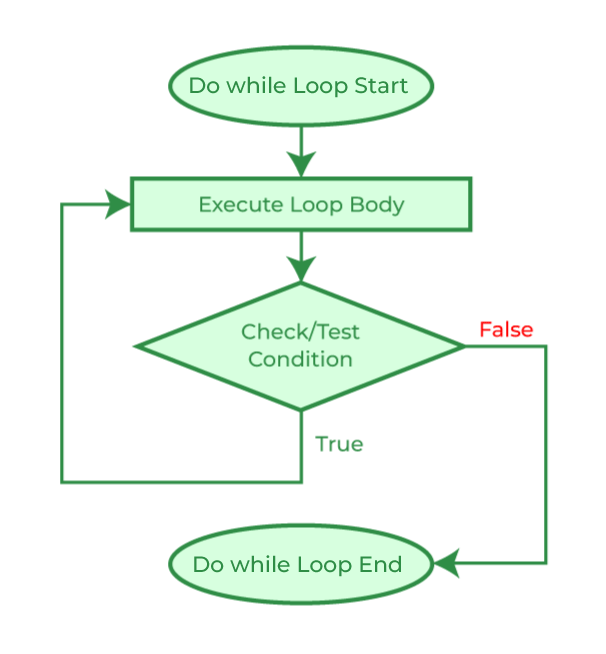Table of Contents
What is a do-while loop in C?
The do-while loop is a tool in C programming that lets you repeat a set of instructions until a certain condition is met.
Here’s how it works:
- You start with the “do” keyword and write the code that you want to repeat inside curly brackets { }.
- Then you write the “while” keyword and a condition inside parentheses ( ). This condition is what the program checks to see if it should keep repeating the instructions or stop.
- The program starts by doing the instructions inside the curly brackets { }. It keeps doing them over and over until it checks the condition inside the parentheses ( ) and finds out that it’s false.
- Once the condition is false, the program stops repeating the instructions and moves on to the next set of instructions after the do-while loop.

The Syntax for the do-while loop in C programming:
do {
// code to be executed
} while (condition);
- The “do” keyword is used to start the do-while loop block.
- The code that should be executed repeatedly is placed inside the curly braces { } right after the “do” keyword.
- The “while” keyword is used, followed by a condition inside parentheses ( ). This condition is evaluated after each iteration of the loop to determine whether the loop should continue or not.
- A semicolon ; is used to end the do-while loop statement.
- Note that the code inside the curly braces { } will always be executed at least once, regardless of whether the condition is true or false when the loop starts. The condition is checked after the code inside the braces has been executed.
Example of Do-While Loop in C programming
#include <stdio.h>
int main() {
int i = 1;
do {
printf("i = %d\n", i);
i++;
} while (i <= 5);
return 0;
}
This program will print the numbers 1 to 5 using the do-while loop. Here’s how the loop works:
- The program initializes the variable “i” to 1 before the do-while loop starts.
- The program enters the do-while loop block and prints the current value of “i” using printf(). In this case, the value of “i” is 1.
- The program then increments “i” by 1 using the ++ operator. Now “i” has a value of 2.
- The program checks the condition inside the while statement. Since “i” is less than or equal to 5, the condition is true, so the program goes back to step 2 and prints the value of “i” again.
- The program continues to repeat steps 2-4 until the condition inside the while statement becomes false, which happens when “i” is greater than 5.
- Once the condition is false, the program exits the do-while loop block and continues executing the rest of the program, which in this case is just the return statement
When you run this program, you should see the following output:
i = 1
i = 2
i = 3
i = 4
i = 5
Frequently Asked Questions
A do-while loop in C is a type of loop statement that executes a block of code repeatedly until a specified condition is met.the do-while loop will always execute the code block at least once, regardless of whether the condition is true or false.
do {
/* code block to be executed */
} while (condition);
- a
whileloop might not execute the block of code at all if the condition is initially false, whereas ado-whileloop will always execute the block of code at least once before checking the condition. whileloop evaluates the condition before executing the block of code, while thedo-whileloop evaluates the condition after executing the block of code.
break command (C and C++)
To end a do-while loop in C, the condition within the loop must evaluate to false ,or using a break statement to exit the loop
- The structure of a do-while loop is simple and easy to understand.
- The code inside a do while loop is always executed at least once, regardless of the condition.
- The code inside a do while loop will continue to execute as long as the condition is True.
The do-while loop in C is a useful construct for repetitive execution of a block of code. Here are some common use cases for the do-while loop:
- Input validation
- Processing of unknown number of items
- Menu-driven programs
- Game development
Yes, it is possible to have nested do-while loops in C. This means that a do-while loop can be placed inside another do-while loop, or inside any other type of loop. Nested loops are often used to process two-dimensional arrays or to traverse complex data structures.







